Joint Statement from Starbucks and Workers United on The U.S. Supreme Court Ruling

Starbucks and Workers United Prepare for Next Framework Bargaining Session
UPDATED: June 17, 2024
The U.S. Supreme Court’s ruling last week mandates federal courts apply a consistent standard when evaluating NLRB injunction requests. While Starbucks and Workers United have different views of the Court’s opinion, we continue to work closely together and are focused on our shared goal of addressing the issues most important to Starbucks and union-represented partners (employees).
In February we announced we’d begin discussions on a foundational framework. Since then, we’ve held two multi-day bargaining sessions in April and May. We’ve made real progress, and the Starbucks and Workers United teams continue to work together with mutual respect and trust. We are committed to a positive and productive relationship. The work continues and Workers United and Starbucks will embark on their third set of framework bargaining sessions the week of June 24.
There is more to do, and we are focused on working together to achieve our joint goal of reaching a bargaining framework and ratified contracts for represented stores in 2024.
In an 8-1 decision, the U.S. Supreme Court ruled today in favor of consistent federal standards
UPDATED: June 13, 2024
Starbucks believes that our partners are the core of our business, and we are committed to providing everyone who wears the green apron a bridge to a better future. We will continue to focus on making progress toward our goal of reaching ratified contracts for represented stores this year. Consistent federal standards are important in ensuring that employees know their rights and consistent labor practices are upheld no matter where in the country they work and live.
The full SCOTUS opinion can be found here.
Starbucks asks Supreme Court to level the playing field for U.S. employers
Published on: April 20, 2024
On Tuesday, April 23, Starbucks is slated to deliver oral arguments before the U.S. Supreme Court in Starbucks v. McKinney.
We brought this case to level the playing field for U.S. employers by ensuring that the traditional rules for preliminary injunctions apply when federal district courts consider the NLRB’s future requests for extraordinary 10(j) injunctions.
As the Supreme Court has often said, preliminary injunctions are supposed to be extraordinary, and federal courts must verify that the same, traditional across-the-board criteria are met before they are granted.
Consistent federal standards are not only important for employers, but also employees, ensuring each individual knows their rights and consistent labor practices are upheld no matter where in the country they work and live.
As the law currently stands, had the court held the NLRB to the traditional, stringent criteria that govern preliminary injunctions in many other contexts, we believe this case would have come out differently.
We look forward to the Court’s final ruling on the matter this summer.
In the meantime, we continue to focus on our path forward with partners represented by Workers United and our goal of ratified contracts for represented stores this year. Our partners are the core of our business, and we are committed to providing everyone who wears the green apron a bridge to a better future.
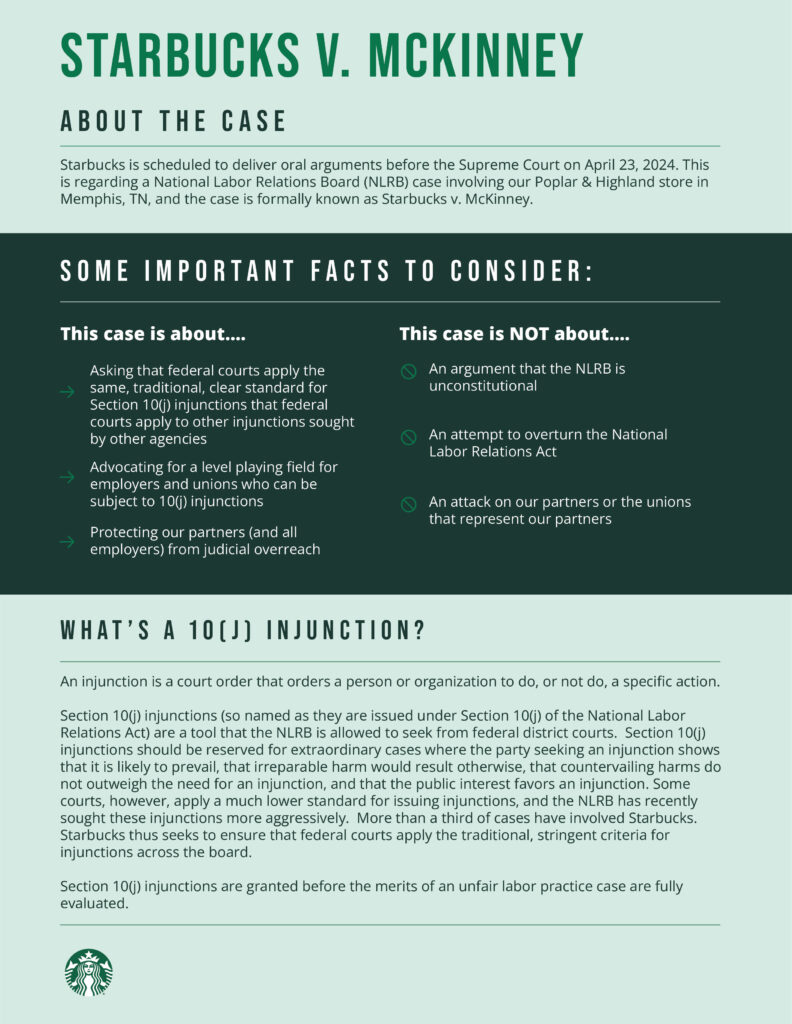
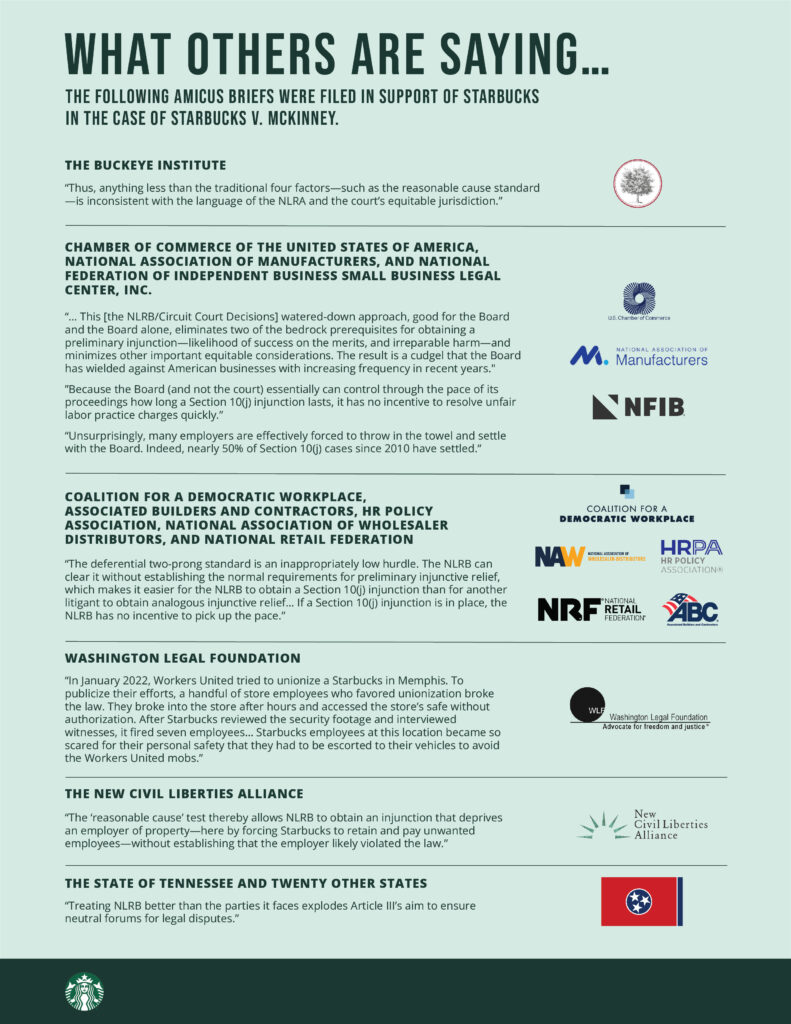
Related: Starbucks is not challenging the constitutionality of the NLRB
What we’re reading…

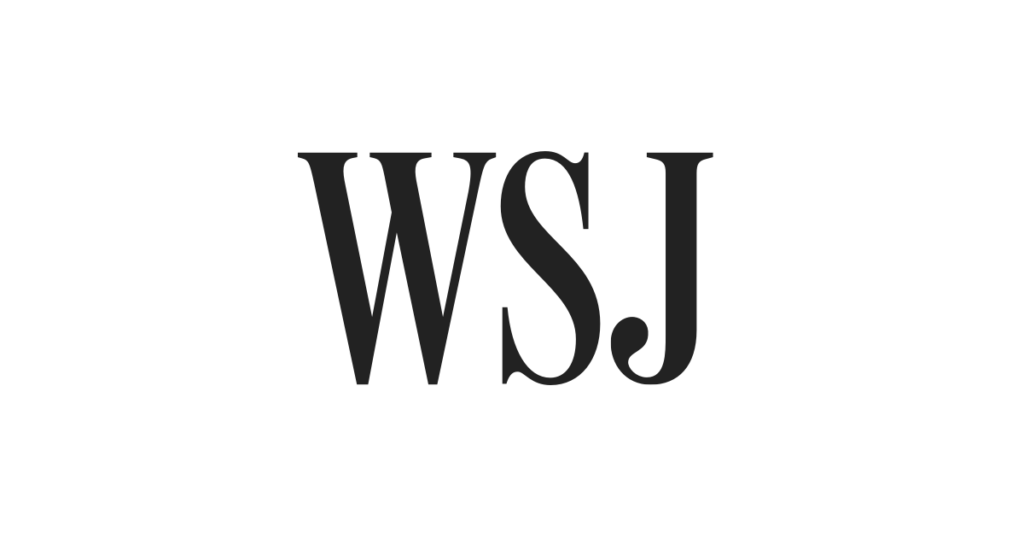

Starbucks appears likely to win Supreme Court dispute with federal labor agency
Associated Press
The U.S. Supreme Court appeared to side with Starbucks Tuesday in a case that could make it harder for the federal government to seek injunctions when it suspects a company of interfering in unionization campaigns. Justices noted during oral arguments that Congress requires the National Labor Relations Board to seek such injunctions in federal court and said that gives the courts the duty to consider several factors, including whether the board would ultimately be successful in its administrative case against a company.
The NLRB Gets Supreme Court Review
Wall Street Journal Editorial Board
The Sixth Circuit’s deferential standard has emboldened the NLRB and its union allies to demand burdensome remedies based on dubious charges. As a matter of law, it tramples employer due process and the constitutional separation of powers. Judges must bless the NLRB’s punishment as long as its allegations aren’t “frivolous.” Dozens of other federal agencies must follow the traditional injunctive relief standard. There’s no legal reason the NLRB shouldn’t have to do the same.
What the Starbucks case at the Supreme Court is all about. Hint: It’s not coffee
NPR
Starbucks is asking the Supreme Court to weigh in on whether some federal circuits — including the 6th Circuit — set too low a bar for granting injunctions. Starbucks points to the onerous burden that injunctions can impose on employers, including forcing them to reinstate employees they fired for violations of company policy, and argues that injunctive relief should be granted only in extraordinary cases — and that there should be consistency in how it is granted. Currently, federal courts use two different standards, or tests, when deciding whether to grant injunctions in cases involving labor organizing.
Supreme Court grants petition to consider creating a level playing field for U.S. employers
Jan. 16, 2024
The National Labor Relations Board (NLRB) has long used the federal courts — which are not held to a consistent standard — to obtain injunctions under Section 10(j) of the National Labor Relations Act (NLRA) before the merits of an unfair labor practice case are fully evaluated. Last Friday, Jan. 12, 2024, the Supreme Court agreed to review a case involving our Poplar & Highland store in Memphis, Tennessee, formally known as McKinney v. Starbucks.
As a company, we felt obligated to stand up for what is right, not only our partners and our company, but also for the employers across the country who are subject to NLRB requests for injunctions in federal courts. We are pleased that the Supreme Court has agreed to hear our case and are hopeful that it will help provide a step toward leveling the playing field for all U.S. employers.
Our petition to the Supreme Court to creating a level playing field for U.S. employers
Oct. 3, 2023
Earlier today, Starbucks filed an appeal — known as a petition for a writ of certiorari — asking the U.S. Supreme Court to review a case regarding our Poplar & Highland store in Memphis, Tennessee.
With this petition, we are asking the Court to reconcile a split in federal courts on the appropriate standard to apply when the National Labor Relations Board (NLRB) seeks a preliminary injunction against employers for the duration of NLRB proceedings under Section 10(j) of the National Labor Relations Act (NLRA). In other words, the NLRB continues to use the federal courts — which are split — to obtain remedies before the merits of a case are fully evaluated.
In this case, the U.S. Court of Appeals for the Sixth Circuit applied a relaxed standard that allowed the NLRB to obtain a preliminary injunction — despite evidence refuting the NLRB’s allegations.
That’s why we’re asking the Supreme Court to reconsider the standard some lower courts use to evaluate NLRB injunction requests. As Sixth Circuit Judge Readler emphasized in his opinion, many other federal courts subject NLRB injunction requests to a more appropriate four-factor test. That standard, according to Judge Readler, may well have prevented the NLRB from obtaining an injunction in this matter.
Ensuring a fair environment for all
We are taking this proactive step because we believe the NLRB should be held to a consistent standard, and the Sixth Circuit erred in affirming, or granting, an injunction in this case. Furthermore, the NLRB alone controls how long their proceedings last, so an injunction can force an employer to operate under a federal court order for years as those proceedings play out.
In his opinion, Judge Readler said the Sixth Circuit’s “feeble test has dramatically lowered the bar for the Board in securing an injunction” and “stack[ed] the deck in the Board’s favor.”
Judge Chad A. Readler
U.S. Sixth Circuit Court of Appeals
Preliminary injunctions are an extraordinary tool in the law, reserved for cases where the party seeking an injunction shows that it is likely to prevail and that irreparable harm would result otherwise. Despite being viewed as an extraordinary measure, the NLRB has stepped up its use of section 10(j) injunctions significantly under the direction of NLRB General Counsel Jennifer Abruzzo.
Those conditions were far from the case at our Memphis store, where some partners entered the store after it had been closed to the public, opened the safe after hours without authorization, brought third parties into the closed store and hosted media interviews behind the bar. Even the Board’s own Administrative Law Judge agreed that what occurred in our Memphis store constituted an “audacious intrusion.”
A partner’s involvement in union activity does not exempt them from adhering to the policies and procedures that keep our partners and customers safe. While Starbucks remains committed to complying with the NLRA, it is simply not in line with our values or obligations as an employer to create exceptions to our established and lawful safety and wellbeing policies.
In cases, like this matter, where we believe allegations are unfounded, we are committed to defending ourselves.
Creating a consistent standard
Starbucks is asking the Supreme Court to level the playing field for all U.S. employers by ensuring that a single, correct standard is applied before federal district courts grant the NLRB extraordinary injunctions in the future.
Since the NLRB began more aggressively pursuing Section 10(j) injunctions, more than a third of cases have involved Starbucks. The company has now had to defend against these injunction requests under three different legal tests across the country, with differing outcomes depending on where — in which federal circuit court — a case is filed.
We feel it is our obligation to not only stand up for our own company, but to also stand up for employers across the country who are in a similar position. As a company, we will continue to stand up for what is right, especially when the outcome impacts our partners.
What we’re reading…
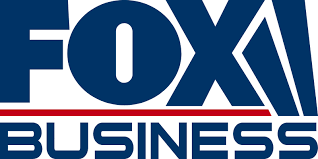
Starbucks asks SCOTUS to level playing field with NLRB
“…Some federal courts make it easier for the labor board to obtain an injunction, such as the one that handled the case in Memphis.”
“The company is trying to force circuits to have the same standard for imposing injunctions, so its doesn’t face different legal standards depending on where a store is located.”
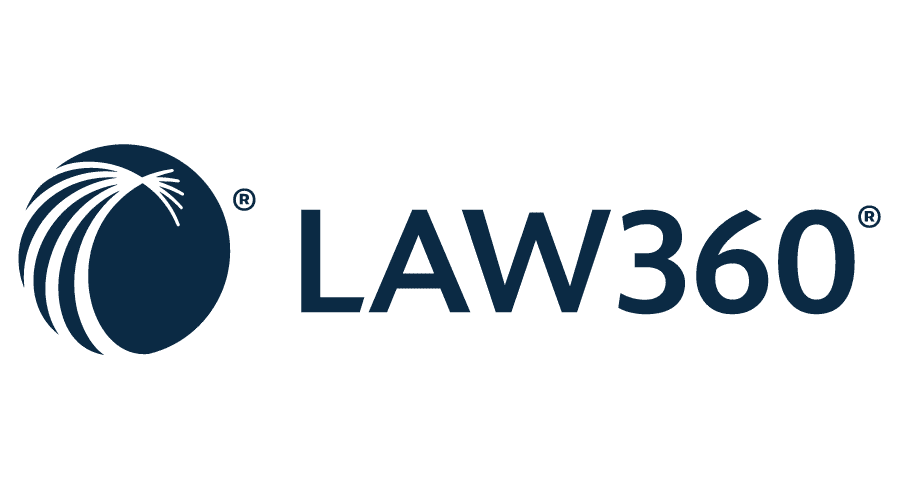
Starbucks Asks Justices To Unify Labor Injunction Standards
“Starbucks urged the U.S. Supreme Court on Tuesday to review a Sixth Circuit ruling upholding a court order to rehire seven pro-union workers at a Tennessee store and resolve an “entrenched, consequential” divide among the courts over how to treat National Labor Relations Board injunction bids.”
“It’s “critically important” for the Supreme Court to resolve this split because current NLRB general counsel Jennifer Abruzzo has repeatedly pledged to use the 10(j) mechanism more.”